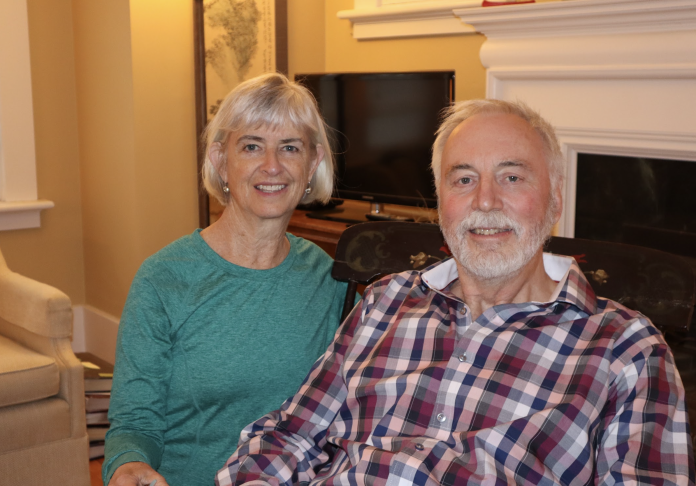By Charlie Senack
Brock Carlton is fighting back against Parkinson’s — literally.
Brock, who was diagnosed with the disease shortly after retiring from a 13-year career as CEO of the Federation of Canadian Municipalities in 2020, said exercise is one of the few things those with Parkinson’s can do to slow down its progression.
Three times a week, Brock attends ‘Boxing 4 Health’ classes on Woodward Drive, a program tailored specifically to those with Parkinson’s.
“When you’re throwing a punch, you’re twisting your body to get a coordinated movement across multiple muscle groups,” the grandfather of three said. “It involves coordination, balance, strength, endurance and fun.”
Brock And his wife, Susan Carlton, also continue cross-country skiing, paddling, canoeing and cycling.
In his free time, Brock volunteers extensively with Parkinson Canada, the national body conducting research, advocating on behalf of those with Parkinson’s and spreading knowledge about the disease.
“I’m on their national Parkinson’s Advisory Council which advises the CEO on the realities of the disease so that this perspective is taken into account in their work,” he said.
He also emcees and sits on the organizing committee for the Ottawa Super Walk, part of a nation-wide fundraising initiative held in cities and towns across Canada each fall.
Brock said that his diagnosis has proved “humbling.” By the time he received his Parkinson’s diagnosis in 2020, he was already experiencing tremors and a loss of endurance. The news didn’t come as a complete surprise.
“It’s hard to handle in the initial moment but I knew something wasn’t going right,” he said, noting it could happen to anyone. “I had been so active and physically strong with lots of endurance. We have paddled Arctic rivers, hiked Mount Kilimanjaro. Now with this disease we have to tailor our strategies so we can continue to do what we like to do.”
Parkinson’s disease is a progressive brain disorder that attacks the body’s nervous system, causing loss of muscle control. Symptoms present themselves slowly and progress over time. Tremors, shaking, slowed movement, and rigid muscles are some of the most common signs.
It’s a disease that impacts one in 500 Canadians with approximately 6,600 new Parkinson’s cases being confirmed in the country each year. Brock is one of over 100,000 Canadians currently fighting the brain disorder.
When Sue found out her husband’s diagnosis, she said it took some time to get over the initial shock. Her positive outlook and spirit is what helped her adapt to their family’s new normal.
“I cried for 48 hours when he came home,” she said. “Brock was one of the most active people. This was a robust guy who could handle so many physically challenging activities. And so, when the news of Parkinson’s came, it was quite a blow all around.”

The Westboro couple first met in the early 1980’s at a Government of Ontario Leadership training Centre in Haliburton. Soon after, Brock left Canada and headed to Kenya to work as an educator. The pair reconnected when he returned to Canada.
Not long after, Brock was again traveling to teach, this time to Xiamen in southern China. He phoned Sue and asked if she wanted to tour around China with him for the summer. She flew to Hong Kong and the rest is history.
The couple have lived in Ottawa since 1985 and raised their three children in the Westboro neighborhood. They say the community’s accessible environment complements their healthy lifestyle.
Brock and Sue said the diagnosis won’t stop them from pursuing the activities that help them thrive. Exercise is an important part of preventing Parkinson’s from spreading, Brock said, noting it’s important to keep your joints active and back straight.
“Last July we cycled the Outer Hebrides of Scotland and it was great. I rented an E-bike so that I could manage the hills, and we could still have the adventure we wanted to have,” he said. “We did about 40 kilometers a day, so we could keep the distance manageable and take time to walk the beaches. This holiday showed us we can still do those things that drive us.”
Sue added that her work as a Non-Violent Communication (NVC) practitioner has given her “a lot of gas” to address the diagnosis. Carlton explained that the practice focuses on compassionate communication through the use of empathy.
“It changes the way I am as a partner, as a friend, as a mom. I’m much more present,” she said. “I think there’s a point in one’s life too, where you want to live with peace.”
“Every day in life, there’s bumps. So when you get a major bump like this one presents, NVC gives skills and tools around gratitude. It just clarifies what really matters,” she added.
Brock said it’s important for him to have friendships with people outside of the Parkinson’s circle and adjust his mindset to recognize he can still do the activities he loves.
Brock and his family will be taking part in Ottawa’s Parkinson Canada Superwalk taking place at Britannia Beach on Sept. 9. It will include entertainment, food, the walk and a silent auction. Last year team Carlton raised almost $10,000. He encourages anyone in Ottawa to join the walk to have some fun and raise funds for this important cause.
“One of the tricks to this is to not define yourself by the disease,” he said. “The walk will be a lot of fun while helping Parkinson Canada raise the funds to support people like me.”
With files by Elissa Mendes
